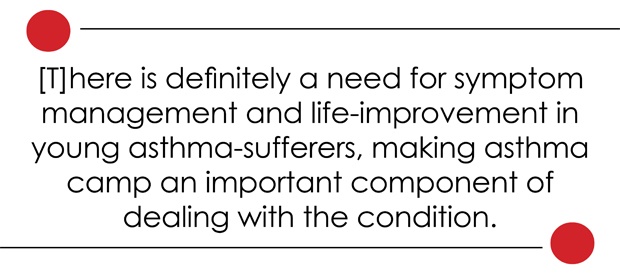
Summer camp in the US conjures up pictures of children having fun, partaking in outdoor activities, roasting marshmallows by the fire and telling ghost stories.
But now there is a different kind of camp parents can send their children to. It's unusual because the children attending this camp all suffer from chronic asthma.
At this camp you can partake in activities such as “make your own mucus” and “the bronchial tube relay race” — all designed to improve your child's asthma.
Why a camp for asthma sufferers?
The approach is to help children cope with the symptoms of asthma in a fun way, as well as raising awareness of the condition. Asthma camps were established for young asthma sufferers to help them understand and deal with their condition in a controlled environment and enjoy the best quality of life possible.
Currently, there are 120 asthma camps serving nearly 10 000 children in the United States of America, according to research published in the Annals of Allergy, Asthma & Immunology.
Camps are facilitated by registered nurses and respiratory therapists. The age groups and severity level differ from camp to camp.
Applying for asthma camp
Application for an asthma camp is the same as for any summer camp, except that you have to provide an additional form filled in by your child’s physician, giving their medical history and current treatment plan. This is submitted along with a standard application form and payment.
These camps vary in length: They can either take the form of a day camp, or an overnight camp for a weekend or a week.
Special guidelines are provided for parents on how to pack their child’s medication, which is carefully monitored for the duration of the camp.
How asthma camps are different
As with normal camps, children still get to partake in activities such as rowing, rock climbing, team games and swimming. But there are loads of activities and sessions created specifically for children to understand their condition and its symptoms. The Consortium on Children’s Asthma Camps lists different sections of the camps, such as activities explaining the anatomy of the lungs, activities based on medication and how to recognise triggers and warning signs of an asthma attack.
Sessions are also focused on coping. An example of one of these activities is to make a “wishing wand” where children can list their asthma wishes such as wanting to play sport, wanting to own their own pet, or “Fly your fears away,” where children are encouraged to talk about their fears of asthma (“I’m scared to get an asthma attack in class”).
The food served at these camps is pretty similar to normal summer camp menus, but food allergies are taken in consideration during the application process.

Overall goals
Asthma camps do make use of volunteers who can apply and receive special training to equip them for this camp, but it is important to have trained medical staff on board as well.
According to the Consortium, there is a camp medical director, camp physician, respiratory therapist and pharmacist involved at every asthma camp. These staff members receive thorough training and orientation before camps and are involved in different sections and activities at the camps.
The overall goal for asthma camps is to provide children with an understanding of their condition, as well as practical tools to help them manage their condition. These camps are not necessarily there to treat asthma, but serve as an education for kids to improve their lives. And as with normal camps, it's important to build social skills and friendships.
A study done on 1 783 campers at 24 different camps indicates that there is definitely a need for symptom management and life-improvement in young asthma-sufferers, making asthma camp an important component of dealing with the condition.
The situation in South Africa
On own soil, the prevalence of asthma is high and treatment limited. And while children tend to outgrow asthma, many adults continue to display the symptoms they experienced in their childhood years.
Control your child’s asthma
Breathing is a function that most of us take for granted, but some are not so lucky. The World Health Organisation (WHO) established that an estimated 235 million people worldwide suffer from asthma and that it’s the most common chronic disease in young children.
Asthma is the fourth highest cause of death in South Africa, yet it is severely undiagnosed with little understanding of the condition.
While we don’t have asthma camps in South Africa, there are ways you can help your child deal with the symptoms:
- Find out what triggers the asthma by means of allergy tests. This will make it easier to eliminate causes.
- Teach your child to use the inhaler and medication exactly as prescribed.
- Tell them to take immediate action when their chest closes up and the inhaler is not helping.
- Make them understand that sport and other physical activities are still possible.
- Have your child thoroughly evaluated by your doctor at least once every four months. Don’t let them stop their medication if symptoms improve. Asthma is a chronic disease and should be treated as such.
Image supplied by iStock




 Publications
Publications
 Partners
Partners











